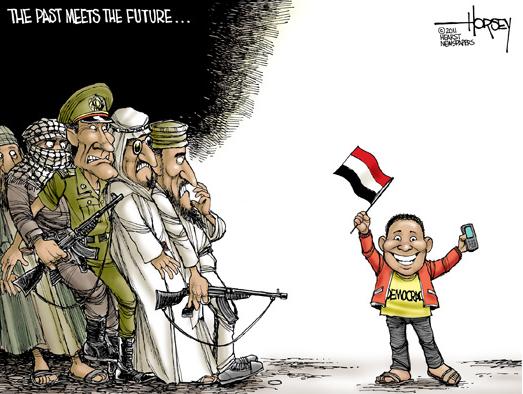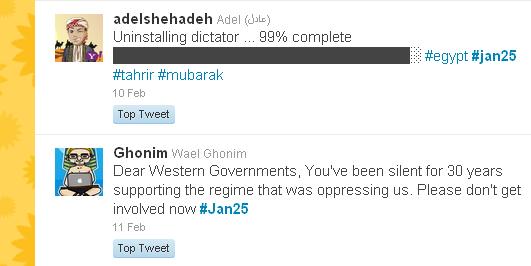 Feb 12, 2011 I love editorial cartoons… they’re storytellers in a sound bite, with a wink and nod to profound societal changes and a snappy headline to boot.
Feb 12, 2011 I love editorial cartoons… they’re storytellers in a sound bite, with a wink and nod to profound societal changes and a snappy headline to boot.
I use cartoons in media literacy deconstruction a lot, because like meaningful manga and graphic novels, they ‘cut to the chase’ with youth appeal and enable us to uncork deeper conversations in give and take style; a ‘starting point’ for engagement. (forewarning: politicos can take a virtual hike here as I’m speaking of a new regime for MEDIA not addressing the pros/cons of what’s next in Egyptian regional stability)
David Horsey’s syndicated Hearst Newspapers cartoon in the Chron this morning stopped me cold with the headline, “The Past Meets the Future” because it succinctly snapshots the evolution of social media and the power of the mobile web and common citizenry to foment change.(see his blog commentary on the revolution in Egypt if you want to talk politics ) Cartoonist Walt Handelsman of Newsday captured a similar tone in “Stop or I’ll Tweet” during the Iran election uprising when I wrote about Neda, mobile youth in action, iconic imagery, and how insta-media shifts us to visual story threads.
I’m not implying the Egyptian uprising was driven only by media savvy youth, (see Facebook’s cause group, “the youth of Egypt deserve a Nobel Peace Prize”)…I AM saying that the amplification via live feeds/blogs and twitter hashtags as well as the pragmatic technological workarounds of global media citizenry literally united in “I’ve got your back” style against bullying has created a ‘new world order’ when it comes to shutting down and blacking out entire information networks.
Screenshot of comments from my Twitter stream, some light and jubilant, some stern and forewarning
Students have always been integral in media mindshifting…pondering rhetoric, questioning authority, and unearthing the “why did we get here” and “what can we do about it”…But everyone should begin to think about the media megaphone of humanity and how it can be used for (or against) goodness and ‘one world’ unity.
If we all pay attention for a nanosecond, we can readily see that the “Old media guard” IS over and new guard is just as Horsey’s cartoon says, the future:
…The mapping power of Google Earth. The SMS uses of prevention, evacuation or formation of ‘smart mobs.’ The eyes of the world watching events unfold. The power of imagery and “photos that changed the world” is everpresent to any scholar of the human condition. And the speed of information flow that’s imperative in a ‘totally wired’ world.
![]() Look no further than yesterday’s newspaper preprinted headlines of Mubarak stubbornly digging in his heels while the REST of the WEB-WISE world were already reading up on his exodus to the Sinai peninsula, the next steps in the pro-democracy regime, and tweeting about regional stability! (ahem, conversely, a Pew Internet Research poll of 1385 showed 52% of Americans didn’t even have Egyptian protests on their current events radar, scary, huh?)
Look no further than yesterday’s newspaper preprinted headlines of Mubarak stubbornly digging in his heels while the REST of the WEB-WISE world were already reading up on his exodus to the Sinai peninsula, the next steps in the pro-democracy regime, and tweeting about regional stability! (ahem, conversely, a Pew Internet Research poll of 1385 showed 52% of Americans didn’t even have Egyptian protests on their current events radar, scary, huh?)
Then you’ve got infographics that capture copious quantities of research and risk assessment into iconic poster style tidbits for mind-mapping what’s next. After tiny Tunisia. Sphinx-stable Egypt. Many say Yemen, including these students. What do you think?
Good Magazine offered added insight into which countries might follow Egypt’s lead and change leadership by posting this “Shoe Thrower’s Index” created by The Economist noting that (“throwing a shoe, as you may remember, is a strong sign of dissatisfaction in Arab and Islamic countries”).
As I wrote earlier in Using Mobile to Mobilize: Tapping Into Youth Info Needs and this one on “Mobile for Good” addressing challenges from Ushahidi fires in Kenya to Frontline SMS and texting aid relief to Haiti yielding 10 million dollars from more than one million donors in a mere 3 days…it’s readily apparent:
Media is shifting to active-tense, hands-on engagement which can literally reboot old guard regimes with ‘power to the people’ taking on a whole fresh new look and purpose.
What can we learn? How can we all be mindful of meddling while using the media to support and inspire? Where are the lines of engagement in the fight for freedom? Are other countries’ citizens bystanders and voyeurs or hands-on helpers? How is new media shaping the way you digest your daily news? What role do you see for yourself globally?
Related Resources, The Shifting Future of Media
Where Might Social Media Aid A Revolt Next? (CBS EarlyNews)
Google, Twitter Help Give Voice to Egyptians (CNN)
Social Media Innovation Aids Egypt Struggle (EconomyWatch)
Wael Ghonim Voice of the (FB) Revolution (Guardian/UK)
Wael Ghonim, A One-Off For Silicon Valley? (CBS/TechTalk)
Will Egypt Be the Next Facebook Powered Revolution?
Egypt’s Internet Blackout Highlights Danger of Weak Links, Usefulness of Quick Links (EFF) Electronic Frontier Foundation
Crowdsourced Egypt Memorial Site To Honor Dead in Uprising (GOOD Mag)
Al Jazeera’s Social Revolution in Real Time (TechCrunch)
The End of History Part II (TechCrunch)
Al Jazeera, L.A: 27-yr old grad student broadcasts voices of Egypt











Hello-
I was wondering if you accept guest posts? I have an event that I would like to tell you about, that incorporates dancing and how it relates to fitness and staying healthy. Primrose Schools is hosting a Dance Off competition (with proceeds going the Children’s Miracle Network Hospitals) for families and I think it is something you and your readers would enjoy!
Emily, I think you were trying to post this on the “Power Of Play” series? (see link below?) Ironically, I’m working on Part3-5 about this very subject so feel free to ping me directly amy at shapingyouth dot org to see if it’s a fit and I’ll take a look?
Really important PBS Frontline follow up piece (thanks @Derekeb via Twitter!)
“What will #Egypt do with roughly two million educated and jobless young people?”
http://www.pbs.org/frontlineworld/stories/egypt804/interview/extended2.html
More Middle East Updates:
Bullets Stall Youthful Push for Arab Spring: NYTimes:
http://www.nytimes.com/2011/03/18/world/middleeast/18youth.html?_r=1&emc=tnt&tntemail1=y
By MICHAEL SLACKMAN
Published: March 17, 2011
Could it be a combination of the two? Does poverty play a major factor? Also, what role does the entertainment industry play in shaping youths’ attitudes toward the criminal lifestyle?